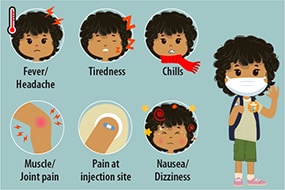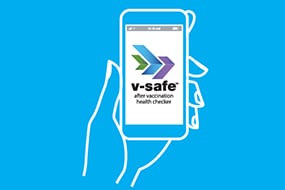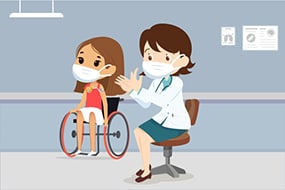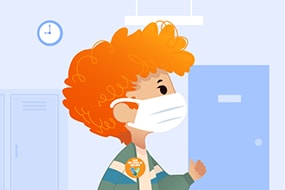We are giving the vaccine on Tuesdays and Thursdays by appointment only during lab hours in the WOODINVILLE OFFICE ONLY: mornings from 9:00 to 11:30 AM and afternoons from 2:00 to 4:30 PM, and at scheduled visits. We will update this page when it becomes available in our Mill Creek location.
Information for parents and caregivers of children ages 6 months and older

For the best protection, CDC recommends COVID-19 vaccines for everyone 6 months and older and boosters for everyone 5 years and older, if eligible.
1. COVID-19 vaccination for children is safe.
Before recommending COVID-19 vaccination for children, scientists conducted clinical trials. Then, the U.S. Food and Drug Administration (FDA) determined COVID-19 vaccines are safe and effective for everyone 6 months and older.
Ongoing safety monitoring shows that COVID-19 vaccination continues to be safe for children. The known risks of COVID-19 and possible severe complications outweigh the potential risks of having a rare, adverse reaction to vaccination.
Learn more about the safety of COVID-19 vaccination for children.

Tips for Parents and Caregivers:
- Before vaccination, tell the vaccine provider about any allergies your child may have—just like what you would do when your child receives their routine vaccines.
- Requesting accommodations at COVID-19 vaccination sites: When making an appointment or arriving for vaccination, you can let staff and/or volunteers know your child might need some accommodations. By law, children are also allowed to have a service animal accompany them. Learn more about COVID-19 Vaccination for Children and Teens with Disabilities.
2. Getting vaccinated can help protect children against COVID-19.
Vaccinating children can:
- Prevent children from getting seriously sick if they do get COVID-19. COVID-19 vaccination continues to protect children against severe disease, including hospitalization. There is no way to tell in advance how children will be affected by COVID-19. Children with underlying medical conditions are more likely to get severely ill from COVID-19. However, healthy children without underlying medical conditions can also experience severe illness.
- Give parents greater confidence for children to participate in childcare and school and in sports, playdates, extracurricular activities, and other group activities.

Tips for Parents and Caregivers:
- Learn more about protecting your family against COVID-19.
- Questions You Can Ask Your School to Learn More About Their COVID-19 Precautions
3. Children may have some side effects after COVID-19 vaccination.
Reported side effects are mild, temporary and like those experienced after routine vaccines. Side effects are more common after the second shot. Some children have no side effects.
Learn more about potential side effects in children after COVID-19 vaccination.


After getting your child vaccinated, use v-safe to get health check-ins and share how your child feels after COVID-19 vaccination.
4. Children receive a smaller dose of COVID-19 vaccine than teens and adults.
COVID-19 vaccine dosage is based on age on the day of vaccination, not on a child’s size or weight. This is also true for other routinely recommended vaccines, like hepatitis A and hepatitis B vaccines.

Tips for Parents and Caregivers:
- Learn more about COVID-19 vaccine dosage for children and COVID-19 boosters for children and teens.
5. Children who have already had COVID-19 should still get vaccinated.
Emerging evidence indicates that people can get added protection by getting vaccinated after they have been infected with the virus that causes COVID-19. For children who have been infected, their next dose can be delayed 3 months from when symptoms started or, if they did not have symptoms, when they received a positive test.
If your child tests positive for COVID-19 after getting their first shot, they should wait until their isolation period has ended before getting their second shot.

6. Children can safely receive other vaccines the same day they receive their COVID-19 vaccine.
Routine vaccination is an important preventive care service that should not be delayed.
If multiple vaccines are given at a single visit, each injection will be given in a different injection site, according to recommendations by age.
FAQs about COVID vaccine
Why Should children 6 months and older get vaccinated?
Children who get COVID-19 can get very sick, can require treatment in a hospital, and in rare situations, can even die. After getting COVID-19, children and teens can also experience a wide range of new, returning, or ongoing health problems. Getting eligible children vaccinated can help prevent them from getting really sick even if they do get infected and help prevent serious short- and long-term complications of COVID-19.
Vaccinating children can also give parents greater confidence in their children participating in childcare, school, and other activities.
Getting a COVID-19 vaccine is a safer, more reliable way to build protection than getting sick with COVID-19. The known risks of COVID-19 and possible severe complications—such as long-term health problems, hospitalization, and even death—outweigh the potential risks of having a rare, adverse reaction to vaccination. The benefit of COVID-19 vaccines, like other vaccines, is that those who get vaccinated get protection without risking the potentially serious consequences of getting sick with COVID-19.
Are children and teens at risk of getting sick from COVID-19?
COVID-19 can make children and teens of any age very sick and sometimes requires treatment in a hospital. In rare situations, the complications from COVID-19 can lead to death. There is no way to tell in advance how children will be affected by COVID-19. Although children with underlying medical conditions are more likely to get severe COVID-19, healthy children without underlying conditions can also experience severe illness.
After getting COVID-19, children and teens can also experience a wide range of new, returning, or ongoing health problems. These post-COVID conditions can be physical or mental, last for weeks, and affect quality of life.
Should children and teens who have previously been infected with COVID-19 get vaccinated?
Emerging evidence indicates that people can get added protection by getting vaccinated after having been infected with COVID-19. So, even if a child has had COVID-19, they should still get vaccinated. For children who have been infected with COVID-19, their next dose can be delayed 3 months from when symptoms started or, if they did not have symptoms, when they received a positive test result.
Should parents and caregivers wait for updated or additional vaccines, if a child is low risk for infection?
Parents and caregivers should get their child vaccinated as soon as vaccines are available to them. Getting vaccinated provides the best protection against serious illness if a child gets infected with COVID-19. Since there is no way to tell in advance how children will be affected by COVID-19—and even healthy children can get really sick—it’s important to get them vaccinated as soon as possible to protect them against severe COVID-19. To see if vaccines are available for a child, talk to a doctor, nurse, pharmacist, call the local health department or clinic, or visit vaccines.gov.
Are COVID-19 vaccines safe for children and teens?
Yes. Before recommending COVID-19 vaccination for children, scientists conducted clinical trials with thousands of children to establish the safety and effectiveness of the vaccines.
Millions of children and teens ages 5 through 17 years have received a first dose of COVID-19 vaccine. Ongoing safety monitoring shows that the known risks and possible severe complications of COVID-19 outweigh the potential risks of having a rare, adverse reaction to vaccination.
Reported side effects tend to be mild, temporary, and like those experienced after routine vaccination. Serious reactions after COVID-19 vaccination in children are rare. When they are reported, serious reactions most frequently occur within a few days after vaccination.
Can children and teens get COVID-19 from a COVID-19 vaccine?
No. mRNA vaccines, like the Pfizer-BioNTech vaccine and Moderna vaccine, do not use the live virus that causes COVID-19 and do not interact with DNA in any way. mRNA vaccines teach the body how to fight the virus that causes COVID-19. Then, the body gets rid of the mRNA within a few days after vaccination.
